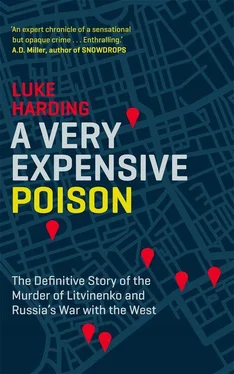According to one friend, Yuri Panchul, Perepilichnyy dreamed of moving to the US. In 1989, he wanted to apply to an American university to do a post-grad in biochemistry or biophysics. Leaving the USSR was no longer a problem but he lacked cash. So Perepilichnyy began trading in computers. Gorbachev had allowed private ventures for the first time. Perepilichnyy began selling computers to government organisations, as well as fax machines, which the Soviet Union had effectively prohibited.
In seven months, between mid-autumn 1989 and spring 1990, Perepilichnyy earned a couple of thousand dollars, and then bigger sums. ‘His perspective on life changed. Originally he was a quiet student who had good grades. He discovered this intense drive for earning money,’ Panchul said. Perepilichnyy bought himself a black Mercedes. He parked it several blocks from his faculty so as not to embarrass his badly off lecturers. He was now an intermediary in the new private economy.
Perepilichnyy’s teachers thought him a capable student and invited him to do a PhD. He declined and in 1991 began trading on the country’s first commodity exchanges. ‘He became a private investor,’ Panchul said. ‘He started to move in circles frequented by all sorts of sharks.’ Many of his new contacts were busy acquiring fortunes through dodgy methods. Perepilichnyy, however, worked openly. ‘He didn’t have a criminal mentality,’ Panchul added. ‘He had some feeling of decency, some rules. He just happened to be in a place where these new rules were not mature.’
By the mid-nineties, Perepilichnyy was a successful investment fund manger. The promising student who played cards and read sci-fi novels now looked after the money of some extremely well-connected Muscovites, who believed him to be a financial genius. They included Olga Stepanova, a top Moscow tax official, and her husband Vladlen. Panchul last spoke to Perepilichnyy in the early noughties. He was doing well and had acquired a flat in London. He was still dealing with ‘strange people’ and ‘taking risks’ but hadn’t lost his ‘moral standards’, Panchul said.
In 2007, Stepanova, and others in a circle featuring interior ministry officials, suddenly acquired very large sums of money. Perepilichnyy sprinkled some of it through accounts he managed on their behalf in Cyprus and Switzerland.
From where had this windfall come?
In 2005, Bill Browder, a US-born financier, was unexpectedly deported from Russia. Browder was the CEO of Hermitage Capital, an asset management company and a major investor in Russia. Browder had been a fan of Putin’s in the early years, seeing him as an ally in the fight against oligarchic malfeasance. Like many others, Browder found the new president inscrutable. He had failed to appreciate that Putin wasn’t interested in cleaning up corruption. Rather his aim was to redistribute the state’s resources among his KGB friends.
The Kremlin-approved attack on Browder left Hermitage vulnerable. In 2007, a group of officials, led by a convicted fraudster, Dmitry Klyuyev, seized three Hermitage firms. They claimed the firms had lost $1 billion and were therefore entitled to a tax refund from the state. On Christmas Eve, a $230 million transfer was secretly approved in a matter of hours – by Perepilichnyy’s client Olga Stepanova, the head of Moscow tax office No. 28. The stolen funds were then laundered though different countries using shell companies.
The criminals made only one mistake: they underestimated Browder. Browder is driven, obsessional and unrelenting. I got to know him after my forced departure from Russia. His personal story – told in a page-turning memoir, Red Notice – is interesting, too. The grandson of Earl Browder, the head of the US Communist Party in the 1930s, Browder had rebelled against his brainy left-wing family and become a capitalist, venturing into Eastern Europe after the collapse of the Soviet bloc.
Stuck in London, he hired a team to investigate back in Russia. It included an idealistic young anti-corruption lawyer called Sergei Magnitsky. In 2008, Magnitsky found out where the stolen money had gone. He filed a complaint to Russian prosecutors. The same officials who had carried out the fraud, including an investigator at the interior ministry, Major Pavel Karpov, had Magnitsky arrested. He was tossed into a freezing cell and refused medical treatment.
Magnitsky suffered from pancreatitis and gallstones, and spent months in pain. The officials wouldn’t allow his family to visit. This state-sanctioned torture was meant to make him withdraw his testimony. He didn’t. Threats were sent to Hermitage in London; one of Browder’s colleagues received a text, quoting from The Godfather Part II, which said: ‘History has taught us that anybody can be killed.’
In Moscow, Magnitsky’s condition grew critical. In November 2009, guards put him in an isolation cell. There, they beat him to death. He was thirty-seven, married, the father of two small boys, and a representative of Russia’s decent middle class. He had believed that the law would protect him, that Russia had said farewell to its Soviet ghosts. It was a tragic misjudgement. At least three other people who testified against the fraud in Russia died in unclear circumstances.
Browder began a global campaign to bring Magnitsky’s killers to justice. Since they occupied mid-ranking positions in the interior ministry and FSB there was no prospect of this happening inside Russia’s own legal system.
Perepilichnyy, meanwhile, was facing big problems of his own. His job, it appears, had been to offer semilegal financial services to a range of clients, including corrupt ones.
During the 2008–9 financial crash he lost much of his clients’ funds. They accused him of robbing them and demanded he repay their market losses. One of them was said to be Dmitry Kovtun, Litvinenko’s killler. Kovtun and Perepilichnyy may have had business together. More probably, though, Perepilchnyy’s enemies invoked Kovtun’s name in order to frighten him.
Perepilichnyy fled Russia and moved with his family to Surrey. In July 2010, he sent an anonymous email to Hermitage under a false Spanish name, Alejandro Sanches.
The email began:
Dear Sirs,
Let me, first of all, express deep respect for your basic civic stand concerning events connected with the Hermitage case.
I am ready to donate some information and documents concerning compensation received by the management of a tax inspectorate for the illegal return from the Russian Federation budget of more than 5 billion roubles.
Perepilichnyy signed off as ‘Sergei’. He said he couldn’t give his real name ‘as my relatives live in Russia’.
His information was astonishing – details of an alleged money-laundering ring involving the Russian mafia and state. It included the identities of those who had pulled off the fraud, print-outs from the Stepanovs’ secret bank account with Credit Suisse, and an explanation as to where the money had gone – on Range Rovers, Moscow real estate and tacky properties in Dubai.
One mansion bought by the Stepanovs was on Palm Jumeirah, the world’s largest man-made island, reclaimed from Dubai’s coast. The island forms the shape of a palm tree as viewed from the air: some residents lived on its ‘trunk’, others on ‘fronds’. The Stepanovs’ villa, number 48, was on Frond F – out of the way by Palm standards, and at the end of a sun-bleached and desolate cul de sac. There are few shops and amenities here. Barriers, cones and a Filipino security guard keep out the uninvited.
At first, Hermitage was suspicious of this unknown Russian. Jamison Firestone, a US lawyer and ally of Browder’s who had hired Magnitsky and knew him well, sent emails back. There was no immediate answer. In August, however, ‘Alejandro’ gave further details. And offered to meet in London.
Читать дальше












